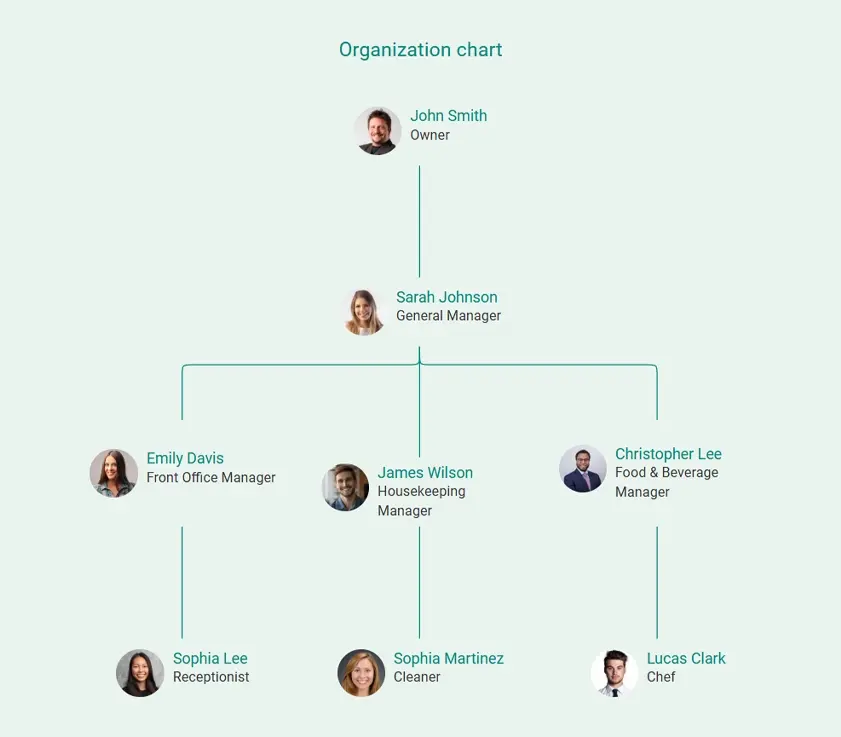Creating a business plan can be very tough for every first-time entrepreneur, and it wasn’t any different for Louis Payne as he brings his dream to life as a hotel owner.
Recently, I sat down with Louis to discuss how he turned his vision into a thriving hospitality business.
We discussed how he overcame challenges and built a hotel that guests love.
This hotel business plan guide compiles insights from our conversation.
Learn how to make a hotel business plan, overcome possible challenges, and succeed as Louis did.
What is a hotel business plan?
A hotel business plan is a professional document that describes the vision, mission, and strategic roadmap for establishing and managing a successful hotel business.
The major elements included in this key document are goal setting, identification of target markets, operational planning, and financial projections.
If you are going to open a hotel business, this plan helps you stay focused, make the right decisions, and overcome problems.
In other words, a hotel business plan is the basic framework of how your hospitality vision can take shape into a profitable reality.
Why do you need a hotel business plan?
If you are starting a hotel business or already have experience in the hotel industry, then it’s imperative to have a well-crafted business plan.
Here’s why:
- A clear and properly structured plan showing your vision, financial projections, and detailed strategies assures that indeed your hotel will be worth an investor’s investment.
- A comprehensive market research helps you identify your ideal guests. So, you can have a variety of service provisions to satisfy them more than they expect.
- An in-depth financial plan, along with revenue forecasts, expenses, cash flow projections, and profit margins, will give a full view of performance against goals, cost management, and data-driven toward profitability.
- Setting clean and clear service standards can ensure guests feel valued, leading to positive reviews, lasting loyalty, and a solid reputation.
In short, a hotel business plan is a must-have tool that guides your journey while reducing risk and maximizing growth potential.
How to write a hotel business plan?
Having a hotel business plan is important in actualizing a new hotel or steering an existing hotel toward growth and prosperity.
A good business plan in the hospitality industry covers from defining your business goals to running daily operations.
So sit back and follow these topics for your own hotel business to meet industry standards that will attract investors:
1. Executive Summary
The executive summary is the backbone of your business—so try to make it very short but simple and effective.
This is built to capture investors, partners, and other stakeholders in making them consider reading more into your proposal.
While the executive summary precedes the business plan, it is best written last; after all other aspects of the business plan are developed. Why? Because it will reflect an accurate and aligned view of your overall strategy.
Here’s what to include in this section:
- Hotel’s name & Location
- Concept of hotel
- Mission statement
- Main services
- Target market
- Marketing plan
- Financial plans & goals
The summary should be clear and concise and impactful enough to grab the attention of interested investors and stakeholders and leave them looking at the rest of your plan.
2. Business Overview
This part describes the detailed structure of your hotel, including mission and vision statements and ownership.
It has to inform potential investors, partners, or stakeholders about the key aspects of your hotel and understand how this business conducts itself and all its areas for development.
While drafting this section, you must include the following elements:
- Business structure
- Mission & vision
- Ownership & management
- Market position
- Growth strategy
- Short-term and long-term goals
This part of the perspective aims to attract potential investors by presenting the structure, aim, and market position of your hotel.
3. Industry Analysis
The industry analysis section is a detailed breakdown of the external environment in which your hotel business intends to operate.
This will help you and/or potential investors get a better understanding of the target market, recent industry trends, economic factors, as well as key competitors. Further, it enables you to find new opportunities and build strategies to stand out.
Here’s how to structure this section:
Current Market Trends
Enumerate the most important trends in the development of the hospitality industry. These could be eco-tourism, focus on all-inclusive vacation resorts, additional talk on technological advancement (mobile check-in, contact-less service), the approach towards vacation and demand for genuine native adventures.
Economic Factors
Include in your analysis such issues as the seasonal nature of tourism, levels of domestic and foreign investment, wager of inflation, world's economic relations influencing the demand for movement and hospitality.
Competitive Landscape
Identify the immediate competitors. Familiarize yourself with what they do well and what they do not do well and from what standpoint your hotel could do better with respect to offering and overall service to the guests.
Regulatory Compliance
All the regulatory and legal factors that may defeat the operations of your hotel have to be discussed, such as local laws on zoning and industry-specific laws that may negate your hotel's operations, such as health and safety, requirements on sustainability, and tourism levies.
"Researching the industry was pretty overwhelming at first, but it really opened my eyes to the bigger picture.
The understanding of trends, knowing who are the big players, and figuring out where our hotel fits in-it was all essential.
This part was what grounded our vision in reality." — Louis Payne.
4. Target Audience
The basis of all your hotel strategy is to understand who your guests are.
You need to get into customer analysis and define who your target market is: business travelers, families on vacation, or couples on a romantic getaway.
But how?
- What are their age, preferences, habits, and lifestyle?
- Put yourself in their shoes about comfort, services, and amenities. Do they need high-speed internet for work or quiet time?
- Your hotel probably has large rooms, modern facilities, or even a restaurant with house specialties. Whatever the feature is, enumerate how the services of your hotel answer the demands of your target market.
This analysis will not only guide how you position your hotel but also shape your overall marketing approach.
5. Marketing Strategy
It is no longer sufficient just to offer great services and excellent rooms — one has to possess a good marketing strategy in order to make it in this business.
Your marketing plan is meant to elaborate how you manage to advertise your hotel whether through online and offline ads, or even through joint promotions.
Here’s a suggestion of a few methods worth trying:
- Advertising on social media
- Offline banner advertising
- Partner-up with local influencer
- Special discount offer
- Set smart pricing
- List your hotel on booking site
Additionally, offer loyalty programs or personalized services to keep guests coming back for more.
By adopting this marketing strategy, you shall be assured of being different and also captivating clients to your hospitality business. The marketing strategy is practical, simple and works to the pleasure of the guest!
"Marketing was where things got fun but also tricky. I had so many ideas, but I had to focus on what would actually work.
It wasn’t just about being creative; it was about showing how we’d attract guests and keep them coming back, all while staying on budget." — Louis Payne.
6. Operations Plan
This is where you will outline major tasks that keep things running well-oiled, so every guest who steps through your doors can be assured of a world-class experience.
Here is what to include in your business operations plan:
- Staffing and Job Description: Clearly define all positions in the organization, from front desk staff to housekeeping staff.
- Housekeeping and Maintenance: Describe procedures to be followed for cleaning the rooms and preventive maintenance, and procedures for dealing with repairs or issues.
- Room Types and Guest Amenities: Describe the type of accommodation you will be offering, and what each guest may expect in respect of facilities. (Example: include Wi-Fi, minibars or pubs, game zone, spa)
- Technology and Automation: You can use digital check-in or check-out systems, smart room controls, and smart food order systems.
This may provide you with operational efficiencies or competitive advantages in enhancing the experience for your guests.
This will make your hotel concept very smooth, advanced, and efficient.
7. Management Team
As the title suggests, this part welcomes the readers to the managerial team and the structure of your organization.
So, first, focus on the owners or founders. Discuss their various roles and responsibilities, qualifications, as well as their hospitality industry expertise.
Then, feature the executive-level members and key players helping the hotel run smoothly and efficiently. State their duties and qualifications, along with their past industry experience.
If necessary, present an organizational chart in order to demonstrate how the team is organized, how various tasks and responsibilities are related, and how the chain of command operates. For example:

8. Financial Plan
Your financial plan for your hotel is critical for attracting investors and sustaining long-term profits. It enables you to explain how the hotel will generate revenues and maintain financial viability in the coming years.
Your hotel financial plan typically includes the detailed projections of revenue, expenses, and profits over the first 3-5 years.
Here are a few critical financial statements and reports you must include in your plan:
- Cash flow statement
- Income statement
- Balance sheet
- Break-even analysis
- Financing strategies
- Risk management plan
Also, ensure you forecast your start-up costs, revenue projections, and how much money you need to raise.
Download the hotel business plan template
So, are you ready to start drafting your hotel business plan from scratch? But need extra help or more assistance with that? Don't worry; download our hotel business plan template PDF to get started.
This investor-friendly template includes real-life examples and actionable insights to guide you from pre-opening strategies to financial projections. Simply download it and customize it to fit your unique vision and goals.
Conclusion
Let’s wrap up! With this comprehensive guide and free hotel business plan template, you’re now well-equipped to create your very own plan.
But if you’re feeling stuck or need expert-level guidance to refine your plan, consider consulting with the best business plan consultants. They’ll help you craft a detailed, investor-ready plan that sets you up for success.
So, why wait? Start planning to build the hotel business you’ve always envisioned!
Frequently Asked Questions
Why is a hotel business plan important?
The hotel business plan is important in a way that it helps in acquiring finances, outlines your strategy, and can help one sail through daily operations with ease. It allows you to align your goals, attract investors, and make clear pathways to business growth.
What will the hotel business plan include?
Some of the major components will be the executive summary, company analysis, industry and customer analysis, marketing strategy, operational plan, management team details, and financial plan.
How do I find my target market for a hotel?
It will take very detailed customer analysis through truly understanding the preferences, behavior, and needs of the ideal guest. Consider demographics, travel habits, and specific amenities they may want.
What is the role of the financial plan in the hotel business?
The financial plan will present a forecast of revenue, expenses, cash flow, and profit margins that serve as a base to analyze performance and control costs to ensure profitability.
Can I adapt my hotel business plan over time?
Yes, your hotel business plan can be adjusted when market conditions, customer preferences, or business goals change to stay on track with demands and opportunities.

